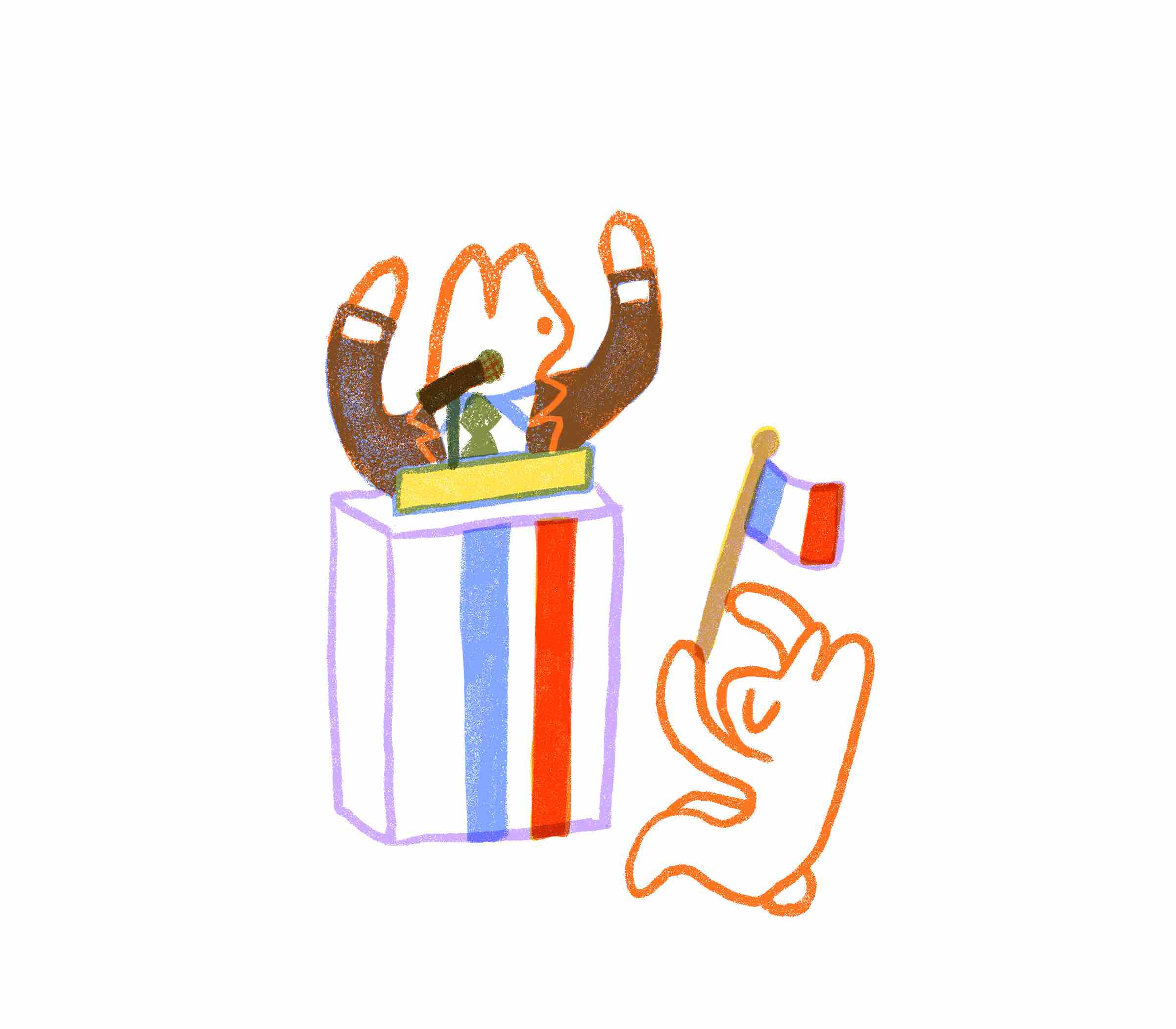An early assessment of the French presidential candidate Éric Zemmour
Editors’ Note: This article was written in November 2021, so some facts and insights may be out of date.
French politics have lurched to the right, and so has President Emmanuel Macron. Amidst national crises and shaky approval ratings, he claims woke leftism is ruining France and presents himself as the law-and-order candidate for the upcoming elections. He now seems a far cry from the young centrist who hijacked the political establishment to win the Élysée in 2017. But to defend the presidency in 2022, Macron will have to employ a different strategy. An upstart has emerged from the far right, threatening the established order: His name is Éric Zemmour. In the coming months, Zemmour will compete with Macron and others for a certain slice of the nation’s electorate. This will be France’s fight for the right.
A polemicist and revisionist historian, Zemmour’s forays into television and radio shows have earned him publicity and infamy in equal measure. By November, he had yet to even announce his candidacy, but he was polling higher than right-wing National Rally leader Marine Le Pen. Even before entering the race, a Le Monde poll gave him as much as 17 percent of the first-round vote. Since then, however, cracks have begun to show in his campaign, and Zemmour has lost some of his momentum. Nonetheless, he is in a unique position to consolidate opposing factions of the French right and is poised to threaten Macron’s incumbency.

France has one of the strongest leftist traditions in the West. So, what can account for this drastic shift in its political landscape? Simply put, the country’s left is in shambles: The Mayor of Paris, Anne Hidalgo, currently polls at around 5 percent, and longstanding socialist leader Jean-Luc Mélenchon isn’t doing much better. The far left has failed to evolve past the Trotskyist discourse of the ’70s, and, unlike in Germany, the Green Party has never been a dominant presence in France. This weakened state of the left has intensified the rightward slant of French politics. As such, the outcome of the 2022 election will hinge on the right-wing voting electorate.
The French right is complex. While the nation’s political parties are fickle, 200 years of factionalism have produced several longterm ideological traditions. René Rémond’s classic 1982 work “Les Droites en France” identified three major currents which continue to define the French right to this day.
The ‘Orléaniste’ faction derives its name from the Duke of Orléans—an aristocrat who famously participated in the French Revolution—and is comprised of a comfortably elitist group of moderates. Well-educated and EU-friendly, the Droite Orléaniste has produced two president-kings: Valéry Giscard d’Estaing and his protégé Emmanuel Macron. With the latter now on the throne, this can be considered the reigning establishment of French politics. While Macron presented himself as a centrist in 2017, he has since operated on a largely Orléaniste platform—socially liberal, but latently monarchical in his presidential style and wary of the bureaucratic leviathan that is the French civil service.
Moving a little further right, we find the ‘Bonapartist’ or ‘Gaullist’ right. Championed by legendary résistant Charles de Gaulle in the post-war era, it relies on strong leaders and a healthy rural support base. In the Napoleonic tradition, Bonapartism likes to invest maximum power in the president while appealing directly to the masses through plebiscites. It has produced several presidents, but since the uninspired administration of Nicolas Sarkozy, the Bonapartists have been leaderless.
And finally, on the furthest reaches of the political spectrum, we find the extreme right. Despite its fringe status, this is one of the oldest ideological currents. The Extrême Droite is a reactionary movement that longs for a return to the France that existed before socialists skewed discourse left in the ’60s. Since Marshall Pétain’s Vichy régime of the ’40s, it has sought to replace the Republic’s tripartite national motto ‘liberté, égalité, fraternité’ with ‘travail, famille, patrie’ (work, family, fatherland). Jean-Marie Le Pen and his daughter Marine have kept the movement simmering over the last 50 years. But the French far-right has experienced a somewhat painful afterlife, and the Élysée has so far eluded them.
So to which right does Zemmour truly belong? He would self-identify as Bonapartist, but as a student of nationalist and proto-fascist theorist Charles Maurras, he is evidently a product of the far-right. He does not like to be characterized as a man of the Extrême Droite, retorting that “it is an old Stalinist method [to] call your opponents fascists.” But why would an advocate of the Great Replacement theory reject the far-right label?

Because Zemmour wants to keep his support base broad and socially acceptable. For a decade, he has quietly watched Marine Le Pen repent for the overt racism of her father. He cannot afford to become the social pariah that was Jean-Marie, nor the compromising apologist that is Marine.
Instead, Zemmour will try to co-opt the traditional right while feeding on the underlying sentiments of the far-right. In the 60 year history of France’s Fifth Republic, no politician has succeeded in uniting these two factions under one banner. The self-respecting Bonapartists have looked down on the far-right as a madhouse, while the far-right has defined itself in opposition to the mainstream currents of French society. If Zemmour can pull off this elusive union of interests, he solidifies his bid for the presidency.
It is Zemmour’s propensity to dominate headlines that has propelled him to political notoriety in the post-Trump era. He is a man of contradictions: Despite his North African Jewish roots, he is a Dreyfus Affair and Vichy Régime apologist, earning him the widespread condemnation of the nation’s Jewish community. Zemmour’s parents immigrated to France from Algeria in the ’50s, yet he is fiercely opposed to immigration. He claims religion is a private matter but insists that French and Islamic cultures are incompatible—a contentious claim in a country where Muslims number 4 million. He was even convicted in 2011 for inciting racial hatred on national television. Yes, Zemmour is something of an enigma.
He is, above all else, a provocateur, and his stunts have generated massive online traffic. He broke the internet in October for pointing an unloaded sniper rifle at journalists on the trail. At his raucous rallies, he’s been pictured giving a critic the finger and put in a headlock by a protestor. He also supposedly got his top political aide pregnant. Concurrent with these scandals, some of his rivals have gained in the polls. Macron’s perceived strong-arm of British Prime Minister Boris Johnson over a row concerning migrants helped his numbers, and Le Pen also gained back a few points. It is hard to say whether these setbacks will truly hinder Zemmour’s campaign or only generate more conversation; his stunts have, at a minimum, propelled his candidacy into the mainstream.
French politics have fundamentally changed since Macron won the Élysée five long years ago. Mass public protests and a doleful pandemic response have stained Macron’s record. And the enduring psychological effects of terrorism cannot be overstated. Though they didn’t occur under Macron, events such as the Charlie Hebdo shooting and the Nov. 13 Paris attacks have inflicted major cultural trauma. As the incumbent, he naturally dominates by a fair margin in the polls at this early stage, but the desire for security and closed borders remains strong, and Macron may struggle to silence the Zemmour and Le Pen supporters on this matter.
If Zemmour succeeds in uniting the right between now and the April primary, he will likely steal Le Pen’s de facto position as Macron’s challenger. Could France be the next European nation to embrace right-wing nationalism? It’s too early to confidently predict an outcome, but Zemmour’s right seems poised to cause an upset. “If I don’t run, it will be seen as desertion, as treason,” said Zemmour. “I will choose the moment myself, and it will be there soon.”
